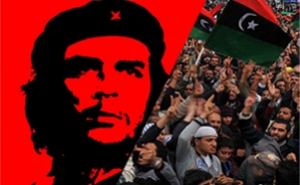From 1968 to 2011: A Study in Rose
On 17th December 2010, Mohammed Bouazizi instigated the Year of the Protest two-weeks before its Gregorian allotment. The Tunisian street vendor, wounded by oppression and diseased by the malignancy of autocracy, took a match to his gasoline-drenched body at 11:30am, immolating himself and lighting a touch paper that would spread across the continent and then the world. It was a Friday.
On 9th October, 1967, Ché Guevara conceived its predecessor. The Marxist revolutionary, who had rested in political obscurity for the best part of three years, emerged and was killed during a battle between army troops and guerillas in the jungle village of Higueras, in south-east Bolivia. It was a Friday almost four decades earlier.
If the death of the former marked the start of the protests of 2011, then it did so in homage to the latter. 1968, like 2011, was a year of mass political turmoil; from the industrial workers of France to their brethren in Poland, from the political dissidents of Czechoslovakia to their less-armed but no less-sincere scholars on the coasts of America, from the guerillas of Angola and Mozambique to the massacred students of Mexico City. 1968 was an awakening of New Left protests that inspired or disheartened, depending on perspective. It was the year of the soixante-huitard.
The 2011 generation, for its worth, matched its protesting mentors blow for blow; from the martyrs of Syrian emancipation to the heroines of Saudi Arabia’s downtrodden women, from the ad hoc rebels of Tunisia to their organized counter-parts in Libya, from the students of our own institutions to the teachers of South America’s, from the 99% here to the 99% there.
As far as years go, 1968 and 2011 were unusual, sharing much more in common with each other than their chronological neighbors. They were moments we wait for; times when all the necessary motivators converge on individuals desperate for help and desperate for change; when the perfect cocktail of political disenfranchisement, individual awareness and social responsibility is mixed and served warm. (How much more might we have known of the white-ribbon wearing anti-tyranny protesters of Russia were it not for such biting winters).
There is, though, a peculiarity that distinguishes 1968 from her imitator 43 years later. Where 1968 had workers united, 2011 just had workers. Solidarity was not part of the equation in the 21st centuries political rebuttal. The French revolution sought liberty, fraternity, and equality. The global revolutions of the last year trumpeted and the former and insinuated the latter, the nuance of the fraternal was lost somewhere in their 140-character manifestos.
The soixante-huitard envisaged a New Left of social solidarity and progressive economics, building of the failures of the enlightenment and the dismissal of Marxism. Their’s was a movement, ours is an opposition. The children born of that year, who sought to overthrow autocracy in the Middle East and economic tyranny in the West, did so for its own sake. There was no community in this occupation; equity of man became equity of money.
For that earlier generation revolution was not defined by circumstance. The Czechoslovakian revolution was not distinctly Czech but distinctly human. Internationalism was a radicalizing force, and it spared no hamlet and no hilltop. Every instance of political disengagement was inextricably linked to that which went before and that which would follow. As the late Christopher Hitchens, a polemic and 68er of insurmountable significance, writes;
- We thought that our own struggle to change the campus rules was a part of the revolutionary agenda. And—unlike the pseudo-radical students of today—we wanted to be allowed to be grown-up rather than to claim another extended tranche of parental protection.
In stark contrast the protesters of Wall St and the revolutionaries of Libya lived in separate worlds, ordered by separate institutions and conducted by separate moralities. The 2011 Year of the Protest was more a year of protests, stitched together by a lazy media and passive politic.
Admittedly, there is a degree of after-the-fact romanticism that has plagued the coverage of 1968. Indeed, it probably wasn’t an epoch of vastly different development. But, rose tinted spectacles were at least made and word then, it seems unlikely retrospect will be so kind to our beleaguered 99%.










